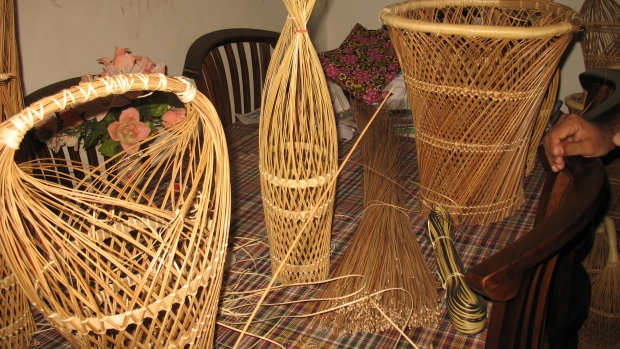Grants :: Small Grant Facilities :: Improving self-employment skills of fisher women in Puttalam
Improving self-employment skills of fisher women in Puttalam

Ekel-based handicraft production by fisher women , Puttalam © IUCN, Kumudini Ekaratne, 2012
Objectives
Conserving coastal ecosystems area by minimizing the destruction of mangroves (overexploitation of mangroves for firewood by fisher women) through the provision of alternative livelihoods for income generation.
Background
Iranawila and Samindugam are two villages coming under the east Iranawila and west Iranawila Grama Niladhari (GN) divisions in the Mahawewa Divisional Secretariat Division in the Puttalam district.
The total population of these two villages is 3,941 and the number of families are 132. About 90% of these villagers are fishermen of which 60% are reported to be illiterate.
There are dense mangroves in the area and these are felled for selling as broom sticks, for constructions of dwellings and for firewood. These bring an additional income to the families, as being illiterate, livelihoods options available especially for women of fisher families are limited. Even though these cuttings are illegal, lawful actions are not practically enforced in these areas.
In this context, the Mihikatha Environmental Organization (MEO), a NGO who had been working in the area for a considerable period of time identified that assisting these families to earn an extra income through alternative income generation activities could encourage the villagers to conserve these mangroves.
Target beneficiaries
40 Beneficiaries were selected with the assistance of the respective Grama Niladharis (village headmen). The initial meeting on 15 June, 2011 introduced the project to the beneficiaries
Outputs
- Twenty women were trained in handicraft production using coconut ekle. A total of 4 training programmes were carried out on 6 October 2011, 17 January and 2 and 11 February 2012 on making waste paper basket, marketing bag, office bag and flower vas, focusing one item at each programme. The estates in the locality provided this raw material free to the beneficiaries.
- These trainees were also provided with tools and raw material; knives, scissors, hammers, planks, synthetic cane, thinner, varnish, sealer and nails.
- Twenty beneficiaries were trained in dress making. Two training programmes on dress making were conducted on 17 and 25 November, 2011. Basic equipments/material needed for dress making such as measuring tapes, tracing wheel, scissors, tracing paper etc were distributed among beneficiaries on the first training session. They were trained in sewing baby shirt and trouser and shirt blouse and frock using blocks.
- Exposure tour to Odel (designer store), Lakpahana (private handicraft shop) and Laksala (the government handicraft emporium) in March 2012 to enhance their skills to produce items of high and marketable quality.
Accomplishments and challenges
The average additional income per month for a beneficiary from selling ekel products is 18-30 USD (2,500 and 4,000 LKR), both to local and foreign tourists. This is about 30-50% of the usual family income. This money is usually saved, as advised by the grantee. However, this income is also used to buy medicine, other needs and for immediate settlement of bank loans.
Similarly, the dress making trainees save about 15 USD (2,000 LKR) per month, as they now attend to all their sewing needs.
Contributions to cross-cutting themes
Sustainable livelihoods
Lessons Learned
• A friendly atmosphere is essential for success.
• Introducing competition amongst beneficiaries results in better products.
• Stringent record keeping was helpful in the successful implementation of the project.
• The support of the Grama Niladharis (village headmen) in selecting the most promising women was important.
Project Facts
Country
Location
The coastal villages of Iranawila and Samindugama in the district of Puttalam.
Topic
Duration
1st Jul 2011 to 30th Apr 2012
MFF Grant Amount
LKR 462,200.00
Implementing Partner
Mrs Gallage Jayaseeli De SilvaMihikatha Environmental Society (MEO), Mahawewa, Sri LankaNo 60, Maligawatha, MahawewaTel: + 94 322253928"Average monthly income of a beneficairy is about LKR 2,750/=. They spend this mainly on the needs of their children" Mrs Jayaseli Galleage, Project Manager, MEO